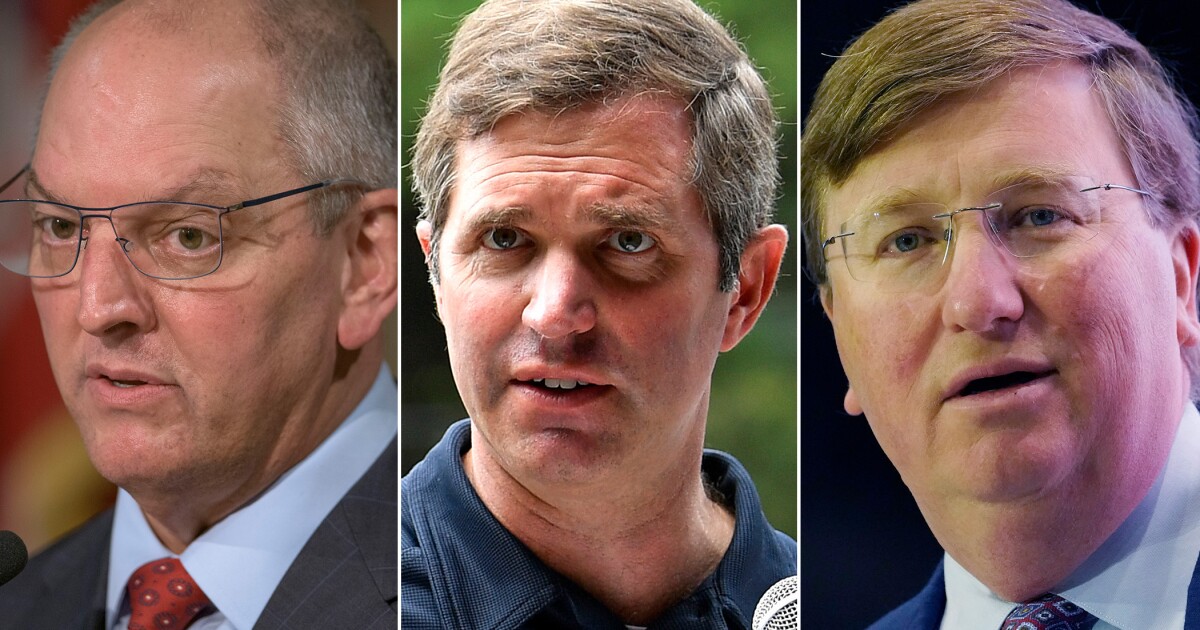

Voters ready for a respite after the rough-and-tumble 2022 midterm elections aren’t going to have much of a break — at least, if they live in Kentucky, Louisiana, or Mississippi, which have gubernatorial elections coming up in November 2023.
The Kentucky and Mississippi contests will test the popularity of Gov. Andy Beshear (D-KY) and Gov. Tate Reeves (R-MS). The open-seat Louisiana contest will show whether term-limited Democratic Gov. John Bel Edwards’s two wins in the deeply red state were a political fluke or if gubernatorial contests can be truly competitive over the long term.
More broadly, the trio of 2023 governor’s races will offer a glimpse into the political mood heading into the 2024 presidential race. With President Joe Biden expected to seek a second White House term and former President Donald Trump the only declared Republican candidate to date, the gubernatorial outcomes will offer a fresh dataset, if a limited one, about which party may have the upper hand.
The campaigns come a year after the Democrats fared much better than expected in the 2022 midterm elections, including governor race pickups. After all incoming governors are inaugurated, Republicans will hold a 26-24 edge over Democrats in state chief executives. That’s down two governors from the current 28-22 split that favors Republicans.
Kentucky
The Bluegrass State’s Jan. 6 filing deadline to run for governor is fast approaching ahead of the May 16 primary for the right to face Beshear.
Republican candidates have already crowded the field, such as Trump-endorsed state Attorney General Daniel Cameron (R-KY) and Kelly Craft, a GOP donor and former U.N. ambassador during the Trump administration. The GOP field also includes state Agriculture Commissioner Ryan Quarles and Kentucky state Auditor Mike Harmon. Somerset Mayor Alan Keck, who leads a community of 12,000 people in heavily conservative southern Kentucky, is also running, and more Republican candidates could jump in at the last minute.
Beshear is a ripe Republican target in a deeply red state, where Trump crushed Biden 62% to 36% in 2020. But the incumbent Democrat may not be so easy to beat. He is one of America’s most popular governors, per an October 2022 Morning Consult survey. He also has millions of dollars in the bank, along with strong name recognition as the current governor and son of Gov. Steve Beshear (D-KY), who held the office from 2007 to 2015. Then-Attorney General Andy Beshear succeeded his father as Kentucky governor by beating Gov. Matt Bevin (R-KY) in the 2019 governor’s race.
Throughout his term, Beshear has had a limited national profile, focusing on Kentucky issues. Beshear mostly makes national news after a tornado or flood has hit his home state and he appeals for federal assistance. Beshear also has tried to build up bipartisan legislative credentials. The Democratic governor and Republican-dominated legislature, for instance, in April 2021 hammered out a compromise election reform law. They found common ground on an issue that has become so contentious and partisan in other states.
The law, enacted in April 2021, provides for three days of no-excuse, early in-person voting, including a Saturday, before Election Day. It also allows counties to establish voting centers where any registered voter in each county can cast their ballot, regardless of their precinct. The law also includes several features aimed at strengthening election security protections.
Louisiana
Edwards has confounded Louisiana Republicans, foiling their plans to win the governorship in 2015 and 2019. But the centrist Democratic governor, a West Point graduate who served in the Army’s elite 82nd Airborne Division and later became an attorney and state lawmaker, must leave office when his two terms as Louisiana’s chief executive are up.
And it may be hard for Democrats to match the crossover appeal of Edwards. A few Democratic state lawmakers are eyeing the race, along with state Transportation Secretary Shawn Wilson.
But the real action is on the Republican side, especially in a state where in 2020 Trump easily beat Biden, 58% to 40%. Louisiana Attorney General Jeff Landry (R-LA) was the first to jump into the race on Oct. 5. Landry was a one-term House member, elected in the 2010 Republican wave. But redistricting in the following election cycle left him out in the political cold, and in 2015, he successfully ran for state attorney general.
Landry has the backing of many state establishment Republican figures. Lt. Gov. Billy Nungesser (R-LA) said he’ll announce his decision in early January. But the Republican field could also be upended by the gubernatorial candidacy of Sen. John Kennedy (R-LA), who has said he’s seriously considering a bid. In 2020, Kennedy won a second, six-year Senate term. It’s not hard to see potential Republican gubernatorial rivals trying to put Kennedy on the defensive for trying to already leave a job voters effectively just gave him an extended contract on.
The filing deadline is Aug. 10 for Louisiana’s all-party “jungle” primary, scheduled for Oct. 14. Assuming no gubernatorial candidate breaks 50% of the vote, the general election will be held on Nov. 18.
Mississippi
Gov. Tate Reeves (R-MS), who won the office in 2019, hasn’t announced if he’s running for reelection yet. That has largely stalled the potential candidate pool in this strongly Republican state. Candidates can’t qualify for state offices until Jan. 3. The filing deadline is Feb. 1, and the primary is set for Aug. 8.
Democratic Public Service Commissioner Brandon Presley’s name has been floated as a potential candidate. Presley in August attracted attention with a six-figure fundraiser held in Tupelo, Mississippi, at the birthplace and museum of Brandon Presley’s famous cousin Elvis. A family connection to the late rock star could help the Democratic officeholder if he seeks a promotion to governor.
And there has been some action on the GOP side. Secretary of State Michael Watson (R-MS) is reportedly considering a run. Several other statewide elected officials also have been mentioned as potential primary challengers to Reeves.
Reeves’s popularity started to tumble early in the coronavirus pandemic, just months after winning the governorship in November 2019. Reeves was the sole elected official who could issue statewide safety orders such as mask mandates and crowd size limits and, at times, seemed to hem-and-haw about which direction to go. Reeves drew criticism from all quarters, including from those who wanted stringent public health regulations and others who believed the government should have been hands-off.
CLICK HERE TO READ MORE FROM THE WASHINGTON EXAMINER
A Morning Consult poll released in October, conducted over a three-month period this summer, tagged Reeves as the nation’s fifth-most unpopular governor. The Mississippi Republican received 48% approval and 42% disapproval.
The countrywide survey found that many governors had positive approval ratings, but Reeves was one of just eight leaders with a rating that was lower than 50%.







